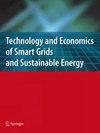分布式能源系统与谈判中的能源共同体
IF 1.5
Q4 ENERGY & FUELS
Technology and Economics of Smart Grids and Sustainable Energy
Pub Date : 2020-11-02
DOI:10.21203/rs.3.rs-99657/v1
引用次数: 10
摘要
新的分散式能源生产技术使规模经济发生了翻天覆地的变化,同时在经济上变得更加可行。与此同时,信息技术的日益普及带来了新的机会,以一种层次更少、更灵活的方式管理基础设施。再加上公民对能源控制的要求,这两种趋势已经把能源社区(ec)提上了议程,尽管在此过程中遇到了障碍,但有可能推进向更可持续的能源系统的过渡。本文介绍了瑞典可持续城市区域规划过程的案例研究,使用参与式观察和与包括利益相关者进行的访谈。我们分析了包括利益相关者如何在该地区建立可持续能源系统,包括微电网。关于微电网的讨论包括两个平行的话语,共存但很少明确面对。该地区的配电系统运营商推广了分布式能源系统(DES)解决方案,而房地产开发商则选择了一个更像公民能源社区(CEC)的微电网。我们讨论了为什么CEC的支持者到目前为止在创建社区拥有的智能电网的战斗中失败了。我们的结论是,不同的模式,一个DES和一个CEC,包含不同的价值观,对能源社区的更多关注可以将过渡路径转向一个更分散的系统,涉及其他优先事项,而不仅仅是经济。本文章由计算机程序翻译,如有差异,请以英文原文为准。
Distributed Energy Systems and Energy Communities Under Negotiation
New decentralized energy-generation technologies have turned economies of scale upside down while becoming more economically viable. At the same time, the increased penetration of information technologies has led to new opportunities to manage infrastructure in a less hierarchical, more flexible way. Together with citizen demands for control over energy, these two converging trends has put energy communities (ECs) on the agenda, potentially advancing the transition towards more sustainable energy systems, despite hindrances encountered on the way. This paper presents a case study of the planning process of a sustainable city district in Sweden, using participatory observations and interviews conducted with included stakeholders. We analyse how the included stakeholders has reasoned about establishing a sustainable energy system in the area, including a microgrid. The discussions on a microgrid comprised two parallel discourses, coexisting but seldomly explicitly confronted. The distribution system operator in the area promoted a distributed energy system (DES) solution, while the property developers opted for a microgrid organized more as a citizen energy community (CEC). We discuss why the CEC proponents so far has lost the battle of creating a community owned smart grid. We conclude that the different models, a DES and a CEC, comprise different values and an increased focus on energy communities could shift the transition pathway towards a more decentralized system involving other prioritise than just economical.
求助全文
通过发布文献求助,成功后即可免费获取论文全文。
去求助
来源期刊

Technology and Economics of Smart Grids and Sustainable Energy
Economics, Econometrics and Finance-Economics and Econometrics
CiteScore
3.90
自引率
18.20%
发文量
33
 求助内容:
求助内容: 应助结果提醒方式:
应助结果提醒方式:


